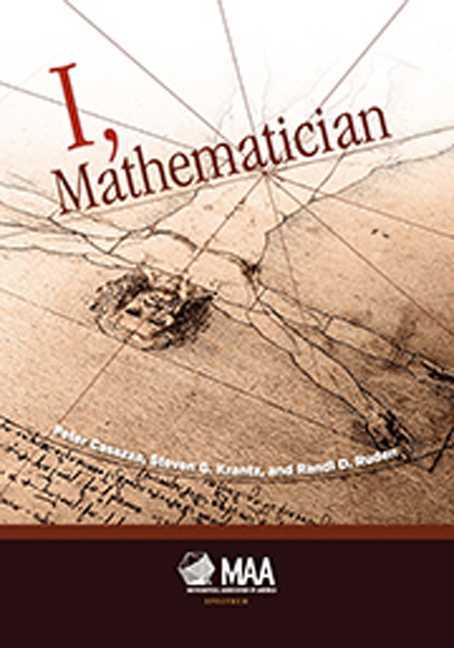Book contents
- Frontmatter
- Contents
- Preface
- Part 1 Who Are Mathematicians?
- Part II On Becoming a Mathematician
- Foreword to On Becoming a Mathematician
- 11 Mathematics and Teaching
- 12 Who We Are and How We Got That Way?
- 13 Social Class and Mathematical Values in the USA
- 14 The Badly Taught High School Calculus Lesson and the Mathematical Journey It Led Me To
- 15 The Psychology of Being a Mathematician
- 16 Dynamics of Mathematical Groups
- 17 Mathematics, Art, Civilization
- 18 Questions about Mathematics
- 19 A Woman Mathematician's Journey
- Part III Why I Became a Mathematician
12 - Who We Are and How We Got That Way?
from Part II - On Becoming a Mathematician
- Frontmatter
- Contents
- Preface
- Part 1 Who Are Mathematicians?
- Part II On Becoming a Mathematician
- Foreword to On Becoming a Mathematician
- 11 Mathematics and Teaching
- 12 Who We Are and How We Got That Way?
- 13 Social Class and Mathematical Values in the USA
- 14 The Badly Taught High School Calculus Lesson and the Mathematical Journey It Led Me To
- 15 The Psychology of Being a Mathematician
- 16 Dynamics of Mathematical Groups
- 17 Mathematics, Art, Civilization
- 18 Questions about Mathematics
- 19 A Woman Mathematician's Journey
- Part III Why I Became a Mathematician
Summary
Abstract The typical research mathematician's view of the external world's view of mathematicians is more pessimistic and less nuanced than any objective measure would support. I shall explore some of the reasons why I think this is so. I submit that mathematics is a “science of the artificial” [18] and that we should wholeheartedly embrace such a positioning of our subject.
Putting Things in Perspective
All professions look bad in the movies …why should scientists expect to be treated differently?
—Michael CrichtonI greatly enjoyed Steve Krantz's article in this collection that he showed me when I asked him to elaborate what he had in mind. I guess I am less pessimistic than he is. This may well reflect the different milieus we have occupied. I see the same glass but it is half full.
Some years ago, my brother Peter surveyed other academic disciplines. He discovered that students who complain mightily about calculus professors still prefer the relative certainty of what we teach and assess to the subjectivity of a creative writing course or the rigors of a physics or chemistry laboratory course. Similarly, while I have met my share of micro-managing Deans—who view mathematics with disdain when they look at the size of our research grants or the infrequency of our patents—I have encountered more obstacles to mathematical innovation within than without the discipline.
I do wish to aim my scattered reflections in generally the right direction: I am more interested in issues of creativity à la Hadamard [4] than in Russell and foundations or Piaget and epistemology … and I should like a dash of “goodwill computing” thrown in. More seriously, I wish to muse about how we work, what keeps us going, how the mathematics profession has changed, how “la plus ça change, la plus ça reste la même,” and the like while juxtaposing how we perceive these matters and how we are perceived. Elsewhere, I have discussed at length my own views about the nature of mathematics from both an aesthetic and a philosophical perspective (see, e.g., [10, 19]).
Information
- Type
- Chapter
- Information
- I, Mathematician , pp. 140 - 155Publisher: Mathematical Association of AmericaPrint publication year: 2015
Accessibility standard: Unknown
Why this information is here
This section outlines the accessibility features of this content - including support for screen readers, full keyboard navigation and high-contrast display options. This may not be relevant for you.Accessibility Information
- 2
- Cited by
